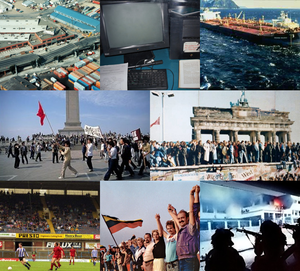This article needs additional citations for verification. (January 2021) |

| Millennium: | 2nd millennium |
|---|---|
| Centuries: | |
| Decades: | |
| Years: |
| 1989 by topic |
|---|
| Subject |
| By country |
|
| Lists of leaders |
| Birth and death categories |
| Establishments and disestablishments categories |
| Works category |
1989 (MCMLXXXIX) was a common year starting on Sunday of the Gregorian calendar, the 1989th year of the Common Era (CE) and Anno Domini (AD) designations, the 989th year of the 2nd millennium, the 89th year of the 20th century, and the 10th and last year of the 1980s decade.
1989 was a turning point in political history with the "Revolutions of 1989" which ended communism in Eastern Bloc of Europe, starting in Poland and Hungary, with experiments in power-sharing coming to a head with the opening of the Berlin Wall in November, the Velvet Revolution in Czechoslovakia and the overthrow of the communist dictatorship in Romania in December; the movement ended in December 1991 with the dissolution of the Soviet Union. Revolutions against communist governments in Eastern Europe mainly succeeded, but the year also saw the suppression by the Chinese government of the 1989 Tiananmen Square protests in Beijing.
It was the year of the first Brazilian direct presidential election in 29 years, since the end of the military government in 1985 that ruled the country for more than twenty years, and marked the redemocratization process's final point.
F. W. de Klerk was elected as State President of South Africa, and his regime gradually dismantled the apartheid system over the next five years, culminating with the 1994 election that brought jailed African National Congress leader Nelson Mandela to power.
The first commercial Internet service providers surfaced in this year,[1][2] as well as the first written proposal for the World Wide Web and New Zealand, Japan and Australia's first Internet connections. The first babies born after preimplantation genetic diagnosis were conceived in late 1989.[3]
- ^ "Company History". Sublime IP. Archived from the original on August 10, 2014. Retrieved August 19, 2014.
- ^ "Wired 7.08: Harmonic Convergence". Wired. January 4, 2009. Archived from the original on April 21, 2014. Retrieved August 19, 2014.
- ^ "Genetic Defect Screened Out; Healthy Twins Born". Los Angeles Times. Archived from the original on March 7, 2016. Retrieved November 14, 2015.